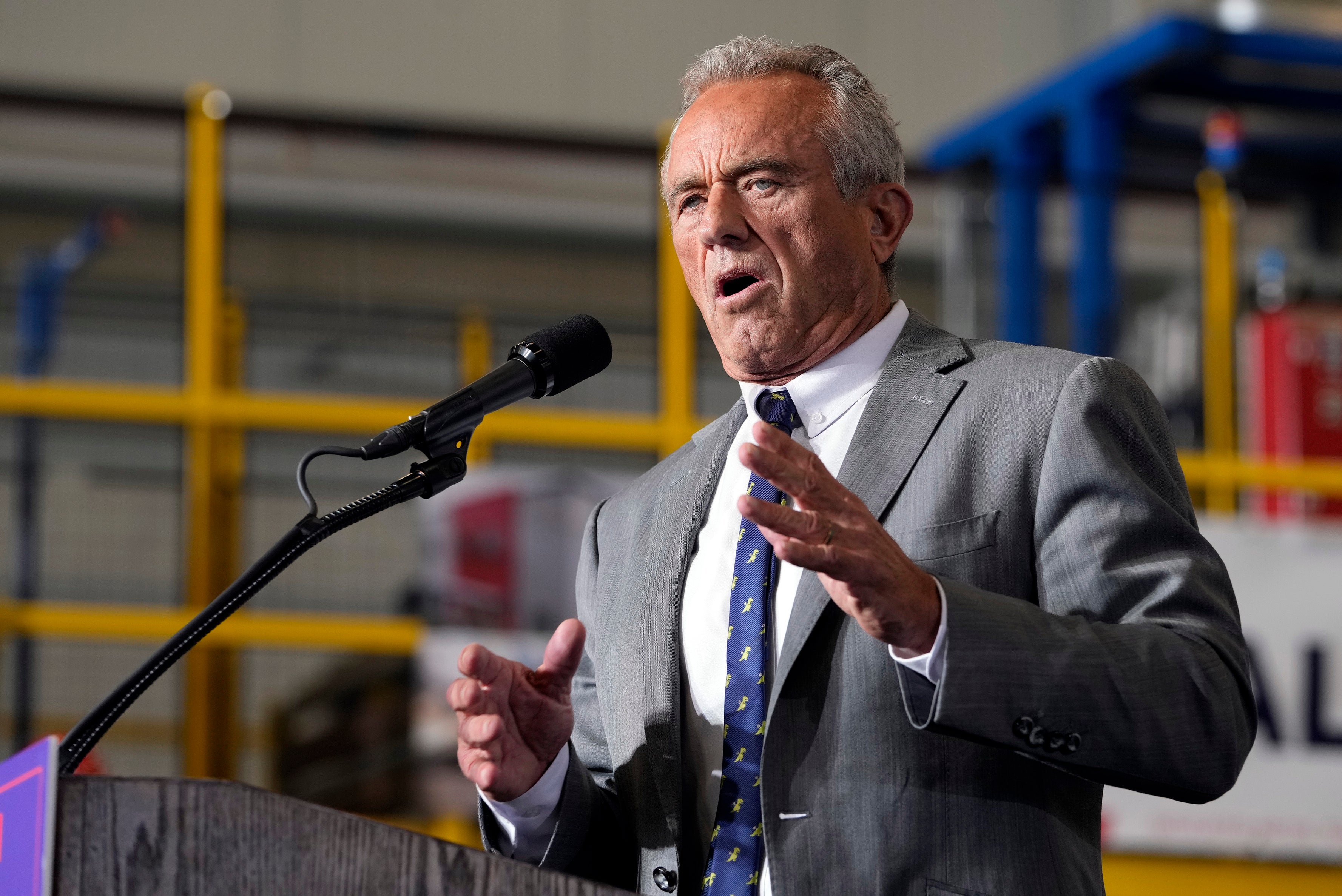What you need to know about fluoride and why it is added to the US water supply
Robert F. Kennedy Jr. has claimed that water fluoridation is associated with numerous health issues

Your support helps us to tell the story
From reproductive rights to climate change to Big Tech, The Independent is on the ground when the story is developing. Whether it's investigating the financials of Elon Musk's pro-Trump PAC or producing our latest documentary, 'The A Word', which shines a light on the American women fighting for reproductive rights, we know how important it is to parse out the facts from the messaging.
At such a critical moment in US history, we need reporters on the ground. Your donation allows us to keep sending journalists to speak to both sides of the story.
The Independent is trusted by Americans across the entire political spectrum. And unlike many other quality news outlets, we choose not to lock Americans out of our reporting and analysis with paywalls. We believe quality journalism should be available to everyone, paid for by those who can afford it.
Your support makes all the difference.Robert F. Kennedy Jr., U.S. President-elect Donald Trump’s choice to head the Department of Health and Human Services, has said Trump will call for an end to adding fluoride to public water supplies.
Communities in Florida, Texas, Oregon, Utah, Wyoming and elsewhere have debated the idea in recent months — the total number is in the dozens, with several deciding to stop adding it to drinking water, according to Fluoride Action Network, an advocacy organization against water fluoridation. In Arkansas, legislators this week filed a bill to repeal the state’s fluoridation program.
The debates have been ignited or fueled by three developments:
—In August, a federal agency reported “with moderate confidence” that there is a link between high levels of fluoride exposure — more than twice the recommended limit — and lower IQ in kids.
—In September, the federal judge ordered the U.S. Environmental Protection Agency to further regulate fluoride in drinking water because high levels could pose a risk to the intellectual development of children.
—This month, just days before the election, Robert F. Kennedy Jr. declared that Donald Trump would push to remove fluoride from drinking water on his first day as president. Trump later picked Kennedy to run the Department of Health and Human Services.

Trump has not announced a position but said it is possible he would make such a recommendation.
Here is what you need to know about fluoridation of drinking water as a public health measure and recent developments surrounding the issue.
What is fluoride and why is it in water?
Fluoride is a mineral that occurs naturally in water, soil and air that has been demonstrated to prevent dental cavities, or tooth decay. It works by strengthening the tooth’s enamel, its hard outer surface, making it more resistant to the acid produced by bacteria that cause tooth decay. Fluoride also reverses early tooth decay by replacing and preventing loss of minerals in teeth.
Prior to the beginning of community water fluoridation, tooth decay was widespread and severe among Americans. After fluoride was added in many places to the U.S. water supply, tooth decay declined in both children and adults, and complete tooth loss in older adults became more rare, according to federal health officials.
In the early 20th century, some U.S. researchers observed that people who lived in areas where community water supplies had naturally occurring high levels of fluoride had teeth that were resistant to decay. In 1945, the Michigan city of Grand Rapids became the first to add fluoride to its water supply in a controlled manner, kicking off what was in effect a large-scale public health experiment. Data over a 15-year span showed a reduction of more than 60% in tooth decay among 30,000 school children in Grand Rapids, demonstrating fluoride’s protective benefits.
By the 1950s, the U.S. government’s Public Health Service and the American Dental Association acknowledged the success of water fluoridation in reducing cavities. This led to the broad U.S. adoption of adding fluoride in community water supplies and eventually its inclusion in dental products such as toothpaste and mouthwash.
No federal law mandates fluoridation of water supplies. The decision to fluoridate water is typically made by municipal governments, city councils or local water authorities.
How widespread is fluoridation?
About 63% of all Americans have fluoride in their community water systems, according to CDC statistics as of 2022. According to the American Dental Association, the average cost per year for U.S. communities to fluoridate their water supplies ranges from 50 cents per person for large communities to $3 per person for small communities.
In most of the world, fluoride is not added to the public water supply. Some countries add fluoride to table salt. In some regions, fluoride levels in water are naturally high.
The U.S. Public Health Service recommends that drinking water levels for fluoride remain below 0.7 milligrams per liter. Levels above 1.5 mg/L are known to increase health risks such as bone fractures, thyroid disease and nervous system damage. The enforceable limit as set by the U.S. Environmental Protection Agency is 4.0 mg/L. A federal judge in California recently ordered the EPA to strengthen its regulations.
What companies make fluoride?
Fluorosilicic acid is the compound most widely used in water systems as it yields free fluoride rapidly when mixed with water. J.R. Simplot and Nutrien’s PCS Phosphate Company are among companies that manufacture the product, according to the EPA.
Total U.S. domestic production of fluorosilicic acid from phosphate rock was approximately 29 million kilograms (32,000 tons) in 2019, according to EPA statistics.
What has Kennedy said about fluoride?
Kennedy, the former independent presidential candidate who subsequently endorsed Trump, is Trump’s pick to be U.S. health secretary. In a social media post three days before Trump was elected, Kennedy wrote that on Jan. 20, “the Trump White House will advise all U.S. water systems to remove fluoride from public water,” noting the day of Trump’s inauguration.
Kennedy has claimed in the absence of conclusive evidence that water fluoridation at U.S. levels is associated with numerous health issues including cancer.
What do public health experts say?
The U.S. Centers for Disease Control and Prevention has called fluoridation of drinking water one of the nation’s top 10 public health achievements of the 20th century, noting that it effectively prevents tooth decay regardless of a person’s socioeconomic status or access to care. The American Dental Association has reiterated its support for community water fluoridation to help prevent tooth decay. Studies show that community water fluoridation reduces tooth decay by more than 25% in children and adults even in an era with widespread availability of fluoride from other sources such as toothpaste, the association said.
Adding fluoride to the water supply has been a boon to the dental health of Americans, and research shows there is a very low risk of adverse consequences, according to Kellogg Schwab of Johns Hopkins Bloomberg School of Public Health in Maryland.
Not all officials agree. Florida Surgeon General Joseph Ladapo, who had a history of controversial public health stances during the COVID-19 pandemic, recently recommended against adding fluoride to community water supplies, citing inconclusive studies that suggest the practice poses a risk to children’s brains.
What do recent studies say?
A review published in October by the Cochrane Database of Systematic Reviews raised questions about the value of fluoridation of public drinking water in wealthy countries based on the findings of 157 studies.
The research suggests that given the widespread addition of fluoride to toothpaste since 1975, community water fluoridation may now have only modest benefits in reducing tooth decay and increasing cavity-free children, compared to the effects seen in earlier studies.
The review also found there is not enough evidence to determine the impact of stopping fluoridation or its effect on socioeconomic disparities in dental health.
Join our commenting forum
Join thought-provoking conversations, follow other Independent readers and see their replies
Comments